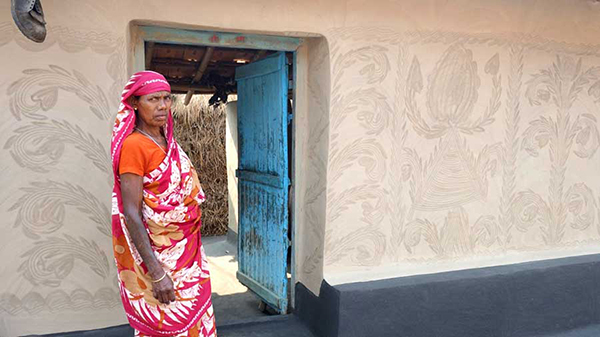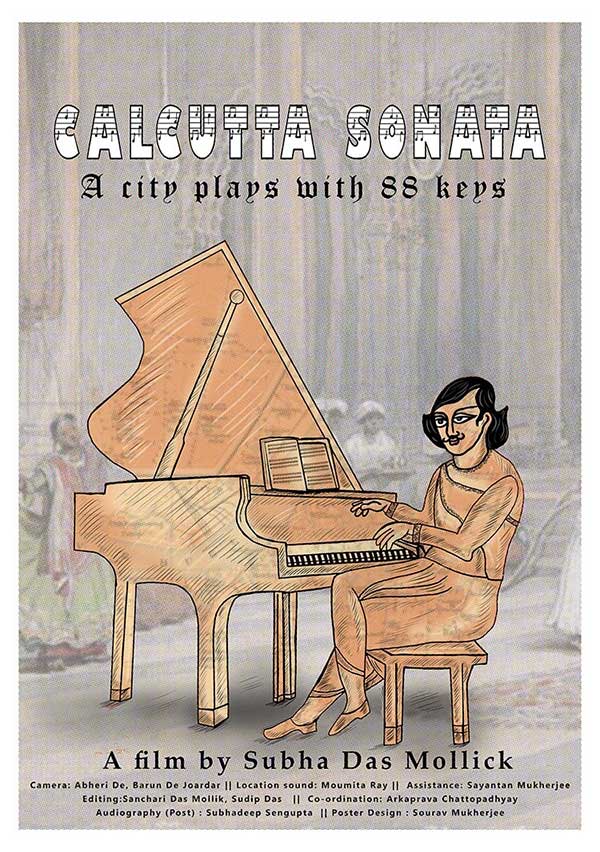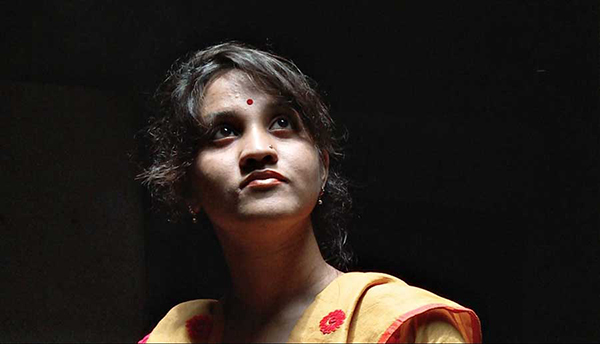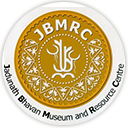Aug 08,2018
FORGOTTEN HISTORIES AND CELLULOID MEMORIES
A month of documentary film screenings
Venue: Barun De Auditorium, 10 Lake Terrace, Kolkata 700029
Dates: Saturday, 11 August, Friday 17 August and Friday, 24 August, 2018
Time: 5.30 pm
(Tea will be served from 5 pm, before the screenings)
The three short films that will be screened at JBMRC during the month of August 2018 are on very different themes. What holds them together, however, is a common concern with forgotten traditions, histories and memories – whether they be of a disappearing tribal art tradition and ritual (the wall paintings of the Santals of Purulia in West Bengal), a musical instrument (the piano in Calcutta) and its musical legacy of practice and connoisseurship, or of the remembrance across generations of the cataclysmic event of the Partition in Bengal. What also stands in common is that each of these films reflects the practice of independent, critical film-making in Kolkata, a practice that urgently needs a supportive platform and public in order to survive.
Sohrai Likhan: The Wall Art of the Santals
Saturday, 11 August, 2018, 5.30 pm
A documentary film by the Daricha Foundation, run by Ratnaboli Bose, supported by the Anthropological Survey of India, Ministry of Culture, Government of India
Duration: 26 minutes
 In preparation for their annual harvest festival, Sohrai, the women of the Santal community, decorate their mud walls with the most stunning traditional art. The motifs, compositions and palettes vary from region to region, with the traditional monochromes gradually disappearing. While the art has been actively promoted in Jharkhand, artists in remote Santal villages of West Bengal too deserve recognition. While exploring the tradition and working processes of Sohrai wall art, the film also pans out in to the broader world of Santal rituals and culture in Purulia. It delves into the Sohrai wall art process, offers a glimpse of the Sohrai festival, which is the culmination of the days and weeks of frantic wall repair and ornamentation, and highlights the reasons why the tradition is being abandoned by some. The documentation for the film was done in North Purulia during 2016-17, and is the most extensive documentation project conducted by the Daricha Foundation.
In preparation for their annual harvest festival, Sohrai, the women of the Santal community, decorate their mud walls with the most stunning traditional art. The motifs, compositions and palettes vary from region to region, with the traditional monochromes gradually disappearing. While the art has been actively promoted in Jharkhand, artists in remote Santal villages of West Bengal too deserve recognition. While exploring the tradition and working processes of Sohrai wall art, the film also pans out in to the broader world of Santal rituals and culture in Purulia. It delves into the Sohrai wall art process, offers a glimpse of the Sohrai festival, which is the culmination of the days and weeks of frantic wall repair and ornamentation, and highlights the reasons why the tradition is being abandoned by some. The documentation for the film was done in North Purulia during 2016-17, and is the most extensive documentation project conducted by the Daricha Foundation.
The film screening will be followed by an interaction between Ratnaboli Bose and Tapati Guha-Thakurta, Professor in History, CSSSC
Calcutta Sonata
Friday, 17 August, 2018. 5.30 pm
A film by Subha Das Mollick
 Calcutta Sonata tells the story of gradual assimilation of the grand musical instrument piano into the cultural fabric of the city. Through the piano the Indian was introduced to the ideas of chords and harmony as opposed to a pure line of melody. Indian musical compositions were infused with western ideas and the well tempered keys of the piano were struck to yield to the microtones of the Indian raga. As the piano proliferated in the city, the support system to maintain the pianos in tune also grew stronger. The grand instrument found its place in Indian homes, schools, churches, play houses, cinema and literature. The city continues to play with 88 keys.
Calcutta Sonata tells the story of gradual assimilation of the grand musical instrument piano into the cultural fabric of the city. Through the piano the Indian was introduced to the ideas of chords and harmony as opposed to a pure line of melody. Indian musical compositions were infused with western ideas and the well tempered keys of the piano were struck to yield to the microtones of the Indian raga. As the piano proliferated in the city, the support system to maintain the pianos in tune also grew stronger. The grand instrument found its place in Indian homes, schools, churches, play houses, cinema and literature. The city continues to play with 88 keys.
The screening will be followed by an interaction between Subha Das Mollick and Dr. Sarvani Gooptu, Professor, Netaji Institute of Asian Studies, Kolkata.
A media teacher and a documentary filmmaker, Subha Das Mollick switched her career from teaching physics to teaching media over 20 years ago. She has made more than 50 documentary and educational films for UGC, other Government departments and also for NGOs. Her recent independent documentary film Calcutta Sonata has won some prestigious awards and is being critically acclaimed. As the founder secretary of Bichitra Pathshala, she is exploring, promoting and demonstrating ways of using cinema as a pedagogical tool.
Our Grandparents’ Home
Friday, 24 August 2018, 5.30 pm
Written, Directed and Produced by Supriyo Sen
Supported by Goethe Institute, Kolkata
Duration: 45 Minutes / Year: 2017, Language: Bengali and English (with English subtitle)
 As 16 young scholars from India and Bangladesh record the memories of the third generation of Partition refugees of 1947, two granddaughters Tunazina Sahrin of Bangladesh and Sanchita Bhattacharya of India embark on a journey to find their root and lost homes. The journeys unfold through disturbing memories, heart rendering recollections and emotional encounters and reveal that multiple generations of survivors perceive identity, nationality and the concept of "home" in a complex way. At a time when the world is confronting the heartbreaking plight of the refugees in different part of the world, the film looks back at the biggest migration of modern history, when 15 million people had been forced to leave their homelands during the blood shedding division of India and the creation of Pakistan in 1947. The film enquires how, even after seventy years, the traumatic division of Indian sub-continent still impacts the physical and psychological existence of the third generation who are born almost 50 years after the defining event of Partition.
As 16 young scholars from India and Bangladesh record the memories of the third generation of Partition refugees of 1947, two granddaughters Tunazina Sahrin of Bangladesh and Sanchita Bhattacharya of India embark on a journey to find their root and lost homes. The journeys unfold through disturbing memories, heart rendering recollections and emotional encounters and reveal that multiple generations of survivors perceive identity, nationality and the concept of "home" in a complex way. At a time when the world is confronting the heartbreaking plight of the refugees in different part of the world, the film looks back at the biggest migration of modern history, when 15 million people had been forced to leave their homelands during the blood shedding division of India and the creation of Pakistan in 1947. The film enquires how, even after seventy years, the traumatic division of Indian sub-continent still impacts the physical and psychological existence of the third generation who are born almost 50 years after the defining event of Partition.
A leading independent documentary filmmaker of India, Supriyo Sen has directed films like "Wait Until Death", "The Nest", "Way Back Home", "Hope Dies Last in War" and “Wagah”. He has won 36 international awards for his films in festivals like Berlinale, Karlovy Vary, Krakow, Bilbao, Hamburg, Uppsala , Abu Dhabi, IFFI, MIFF. Supriyo has won three National Awards including Swarna Kamal for the best Documentary of the Year for "Hope Dies Last in War".
The screening will be followed by an interaction between Supriyo Sen and Manas Ray, Retired Professor in Cultural Studies, CSSSC.
This month of film screenings has been supported by Eastern Diagnostic India Ltd., 13C Mirza Ghalib Street, Kolkata 700016


Leave a Reply
You must be logged in to post a comment.